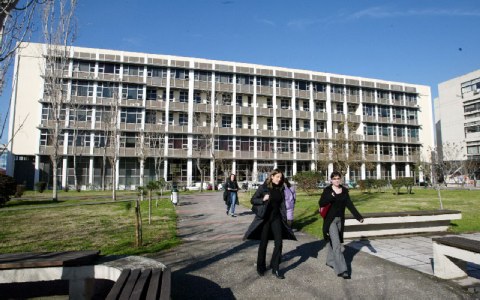The plan, codenamed "Athens", will pass as a cyclone through Greek universities and technical colleges as early as next year. According to reliable sources, at least four provincial universities and over 150 faculties at various universities and technical colleges will be closed.
The government is determined to proceed to the optimization of the country's academic map, since it is required by the economic situation, by the supervisory Troika as well as by the academic conditions, which seem appropriate for such a step.
The first mergers and closures of educational institutions will take place in 2013.
The University of Central Greece in Lamia, The University of Western Greece in Agrinio, The University of Macedonia in Thessaloniki and the University of West Macedonia in Kozani will be among the first affected, and faculties at the University of the Peloponnese, the University of the Aegean, the Democritus University of Thrace and the University of Thessaly will also have to be merged.
As part of the plan for reorganization of higher education over 150 faculties with little or no demand from candidate students will also be closed. The process will affect all universities and technical colleges in which students' interest has been weak for years.
Education Minister Konstantinos Arvanitopoulos has chosen the name "Athens" as a symbol of wisdom and prudence. It is expected that plan "Athens" will lead to the optimization of the number of faculties in the country.

Education Minister Konstantinos Arvanitopoulos
1. How will the "cuts" happen
In August, the management of the Hellenic Quality Assurance Agency will be taken up by its new chairman, and soon after a task force for the reorganization of universities and technical colleges will start working. One of the key issues which the Agency will address is the development of research for the new "geography" of higher education, about which dialogues with representatives of universities and technical colleges will be held.
Based on previous research on what is happening in higher education, the Agency will propose the criteria for "cutting" of faculties. Academic, social and economic criteria. The aim will be to unite the forces of universities and to stop the fragmentation of faculties. The slogan is "Mergers everywhere."
2. Technical colleges for which there is no demand
The top positions in the list include about 60 departments at technical colleges with weak demand and near-zero rates of graduates. Faculties of business management, tourism, aquaculture, floriculture, organic farming, etc. will be assessed, most of which will be closed.
Dozens of sections, scattered throughout towns and villages across the country, will fall under the Agency's microscope. This year, 11 faculties in various technical colleges have already been closed.
"Greece has a serious problem with the mission distortion of technical colleges where there is a tendency to perceive the academic profile of university education", notes the report of the Educational Ministry.
3. The first closed faculties
According to reports from the Quality Assurance Agency, there are dozens of similar faculties throughout the country. For example, there are 22 teaching departments, 32 faculties in informatics, 14 agricultural, 14 theatre departments, 21 faculties of architecture, 36 economic departments and 50 departments of corporate governance.
Thus it was decided for the first optimization steps to be taken at the University of Central Greece in Lamia, The University of Western Greece in Agrinio, the University of Macedonia in Thessaloniki and the University of West Macedonia in Kozani.
Previous assessments of these universities make it clear that the two departments of the University of Central Greece could join the Athens University of Economics and Business and the University of Thessaly, because there are similar departments there. The University of Western Greece's faculties may be transferred to the University of Ioannina. As for the University of West Macedonia, Florina faculties can be moved to the University of Ioannina, and the two engineering faculties in Kozani do not have the necessary facilities and may be closed.

In all cases, the optimization of higher education will be based on three components:
Thematic, in which departments will be merged to subsequently form widened academic units.
Territorial, which will mean the relocation of many "weak" departments to more attractive departments located nearby.
Administrative, in which entire universities will join others with a similar direction.
4. 150 faculties in the red
The forthcoming restructuring of higher education will significantly reduce the number of universities and technical colleges in the country. 24 universities in 36 different cities and 16 technical colleges in 40 cities and smaller towns operate today in Greece. In total, there are over 590 departments. From 1999 to 2009 nearly 100 new departments in universities and technical colleges were founded, thanks to funding from the European Union. Many of them don't have clearly defined scientific areas.
Of the universities, those, located in the Attica region, the cities of Patras, Ioannina, Chania and the island of Corfu, operate within a single city, while the rest have spread in two to six cities. A study of the Ministry of Education shows overlapping areas of scientific activities and educational disciplines, as well as fragmentation, exceeding 60% of the departments.